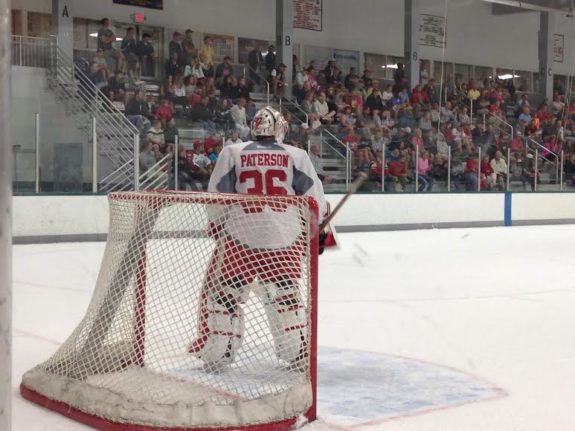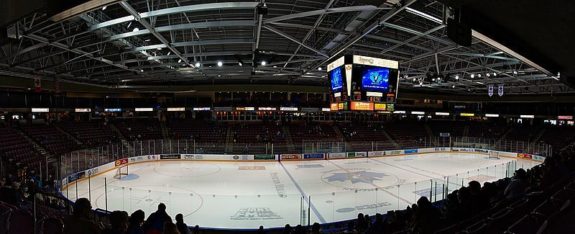Across North America, several NHL prospect tournaments have begun. In all, there are six showcases this year, including:
- NHL Prospect Tournament (Traverse City, MI) – Detroit Red Wings, Columbus Blue Jackets, Dallas Stars & Toronto Maple Leafs
- Prospects Challenge (Buffalo, NY) – Buffalo Sabres, Boston Bruins, Montreal Canadiens, New Jersey Devils, Pittsburgh Penguins & Ottawa Senators
- Rookie Faceoff (Las Vegas, NV) – Vegas Golden Knights, Anaheim Ducks, Arizona Coyotes, Colorado Avalanche, Los Angeles Kings & San Jose Sharks
- Southeast Rookie Showcase (Estero, FL) – Tampa Bay Lightning, Carolina Hurricanes, Florida Panthers & Nashville Predators
- Young Stars Classic (Penticton, BC) – Vancouver Canucks, Calgary Flames, Edmonton Oilers & Winnipeg Jets
- Tom Kurvers Prospect Showcase (St. Paul, MN) – Minnesota Wild, Chicago Blackhawks & St. Louis Blues
In addition, five teams are hosting individual prospect camps of their own. The New York Islanders, New York Rangers, Philadelphia Flyers, Seattle Kraken, and Washington Capitals are not participating in any of the tournaments.
Over the past few years, the prospect tournament landscape has fragmented. The Red Wings’ annual NHL Prospect Tournament—which was once comprised of eight teams—only has four participants this year. In addition, new showcases have sprung up around the continent.
Related: Red Wings Invitees Could Shine at Prospect Tournament
The NHL has an opportunity to standardize prospect tournaments, turn them into marketable events, and grow the game. Here’s how.
Prospect Tournament Locations
First, to maximize exposure to fans and front office personnel, the NHL could condense the amount of tournaments. Four tournaments with eight teams apiece would be a fair division.
But who gets to host these tournaments? My recommendation would be to keep Traverse City and Penticton as hosts since they are the two longest-running prospect showcases. Clearly, they have the infrastructure in place to facilitate these showcases.

As for the other two cities, there should be a lottery draw. NHL and non-NHL cities could enter to have a chance to host one of the two remaining tournaments. Potential hosts would need to check boxes for facilities, hotels, personnel, and other accommodations to be eligible.
New cities every year would give the NHL the opportunity to grow the game further in existing markets and expand into other markets. There’s been talk of Salt Lake City, Atlanta, and Quebec wanting NHL franchises – why not host a prospect tournament as a trial? Smaller cities with appropriate accommodations would be viable options as well and would value the tourist revenue.
This approach would simulate the feel of youth hockey preseason tournaments that NHL prospects once competed in, where teams from across North America would come together even though they play in different leagues, states/provinces, and/or countries.
Teams Competing In the Prospect Tournaments
As for which teams compete in the four tournaments, we’ll turn again to a lottery draw. Detroit would remain a part of the Traverse City tournament, as would Vancouver in the Penticton games. The others, though, will be determined at random.

By randomly placing teams in tournaments, fans and front office personnel would be exposed to players that they don’t normally see. For example, Montreal, Vegas, Seattle, Colorado, Washington, Arizona, and the Rangers could join the Red Wings in Traverse City.
In each tournament, there would be two divisions of four teams. Each division would have a round-robin schedule, with the top team moving on to the championship game. That means three-to-four games for all NHL teams. And overall, that’s 13 games per location for fans and NHL staff to take in.
Related: Maple Leafs Prospects to Watch at Rookie Tournament
But why stop there? PWHL preseason games could also take place during these tournaments, helping to grow their following across North America. It would be great exposure for the new league.
Final Word
Rotating host cities and PWHL participation would help grow the game further. With these changes, the NHL could turn preseason prospect showcases into bigger, marketable events. Even the lottery draws for host cities and tournament participants could be a made-for-TV event.
Sure, there’s more to consider – standard approaches to televising games, hiring officials to oversee the games, and more. But at minimum, this is a nice change-of-pace that could be beneficial for the game of hockey.
